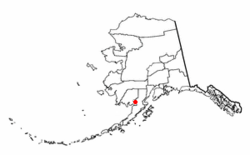Levelock, Alaska facts for kids
Quick facts for kids
Levelock, Alaska
Liivlek
Kivichakh
|
|
|---|---|

Location of Levelock, Alaska
|
|
| Country | United States |
| State | Alaska |
| Borough | Lake and Peninsula |
| Area | |
| • Total | 16.73 sq mi (43.32 km2) |
| • Land | 16.73 sq mi (43.32 km2) |
| • Water | 0.00 sq mi (0.00 km2) |
| Elevation | 50 ft (20 m) |
| Population
(2020)
|
|
| • Total | 69 |
| • Density | 4.13/sq mi (1.59/km2) |
| Time zone | UTC-9 (Alaska (AKST)) |
| • Summer (DST) | UTC-8 (AKDT) |
| ZIP code |
99625
|
| Area code(s) | 907 |
| FIPS code | 02-43810 |
Levelock (pronounced LEE-vlek in the local language, Central Yupik: Liivlek) is a small community in Alaska, United States. It's located along the Kvichak River in the Lake and Peninsula Borough. Long ago, it was also called Kivichakh. In 2020, about 69 people lived there, which was the same number as in 2010.
Contents
Geography of Levelock
Levelock is found at 59°6′37″N 156°51′31″W / 59.11028°N 156.85861°W. It sits on the west side of the Kvichak River. This spot is about 18 miles (29 km) north of where the river meets Kvichak Bay. It's also about 47 miles (76 km) downstream from Igiugig. Igiugig is located at the start of Iliamna Lake.
The total area of Levelock is about 16.73 square miles (43.32 square kilometers). All of this area is land, with no water.
Levelock's Population History
Levelock first appeared on the U.S. Census in 1890. Back then, it was listed as the native village of "Kivichakh." It wasn't counted again until 1950, when it was called Levelock. In 1980, it became a special area called a census-designated place (CDP).
| Historical population | |||
|---|---|---|---|
| Census | Pop. | %± | |
| 1890 | 37 | — | |
| 1950 | 76 | — | |
| 1960 | 88 | 15.8% | |
| 1970 | 74 | −15.9% | |
| 1980 | 79 | 6.8% | |
| 1990 | 105 | 32.9% | |
| 2000 | 122 | 16.2% | |
| 2010 | 69 | −43.4% | |
| 2020 | 69 | 0.0% | |
| U.S. Decennial Census | |||
People Living in Levelock
In 2000, there were 122 people living in Levelock. These people lived in 45 households, and 25 of those were families. Most of the people living there, about 89%, were Native American. About 5% were White, and nearly 6% were from two or more races. A small number, about 2.5%, were Hispanic or Latino.
The average household had about 2.7 people. The average family had almost 4 people. Many households, about 38%, had children under 18 living with them. About 42% of households were made up of single individuals.
Age Groups in Levelock
The population in Levelock was quite young in 2000. About 40% of the people were under 18 years old. Around 8% were between 18 and 24. People aged 25 to 44 made up about 22% of the population. Another 22% were between 45 and 64. Only about 7% of the people were 65 or older. The average age was 28 years old.
Economy and Jobs in Levelock
The community of Levelock has a few main ways that people earn money. One important area is tourism, especially for sport fishing. There are lodges that welcome visitors who come to fish. Another part of the economy is a commercial seafood plant. This plant helps process seafood from the area. Also, some people work in tender services. These services help transport goods along the big rivers in southwest Alaska.
Famous People from Levelock
- Adelheid Herrmann: She was an Alaskan state legislator from 1983 to 1989. She was also a researcher.
See also
 In Spanish: Levelock (Alaska) para niños
In Spanish: Levelock (Alaska) para niños
 | Stephanie Wilson |
 | Charles Bolden |
 | Ronald McNair |
 | Frederick D. Gregory |

